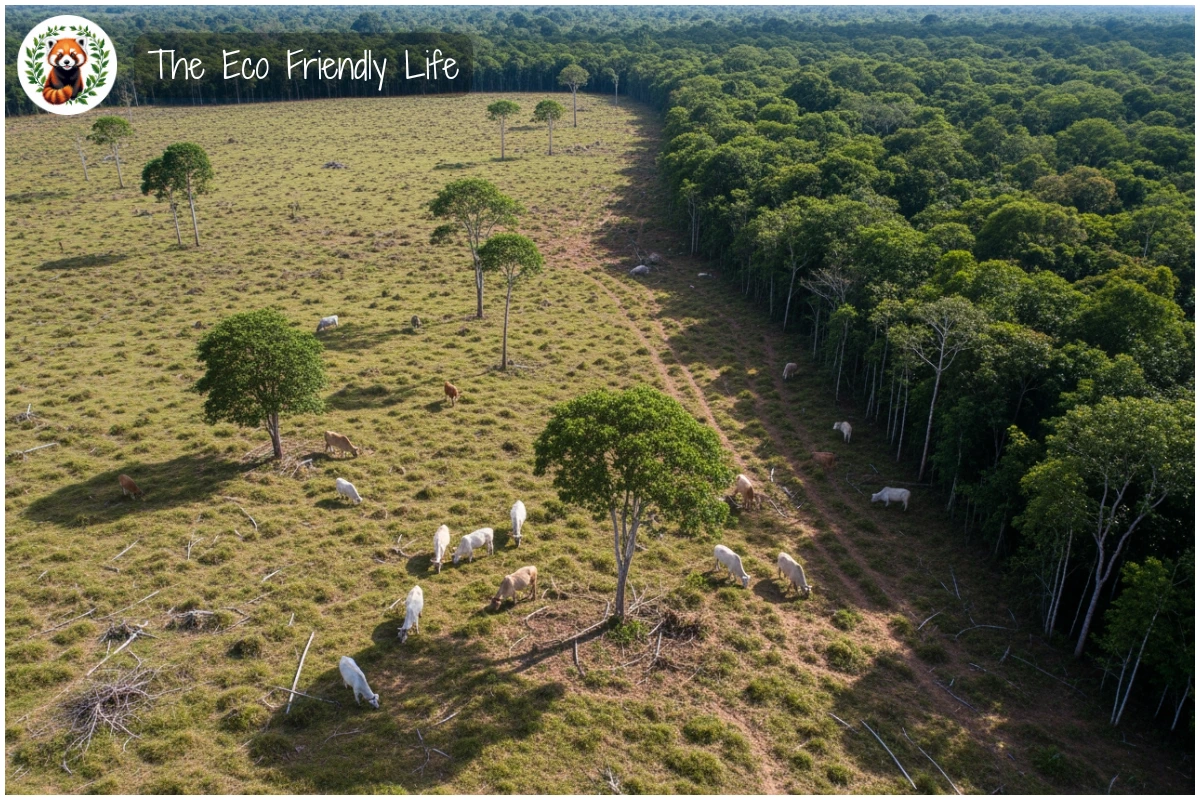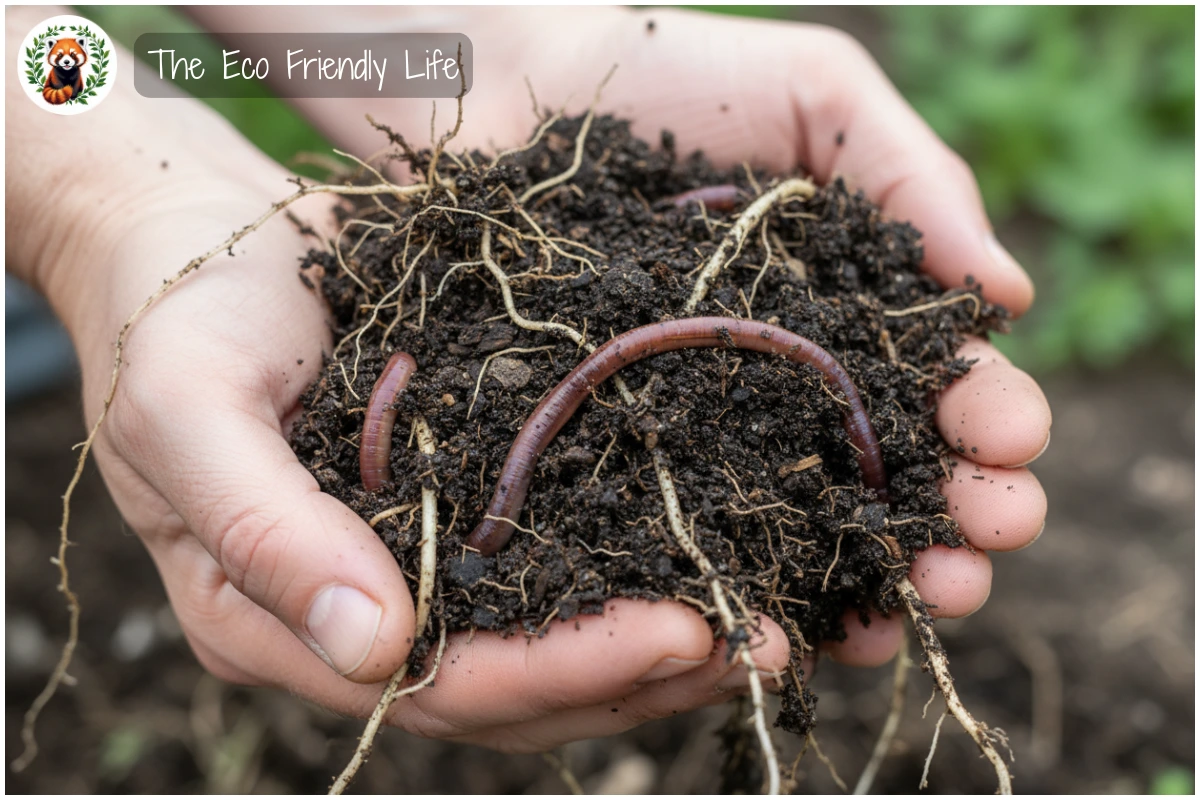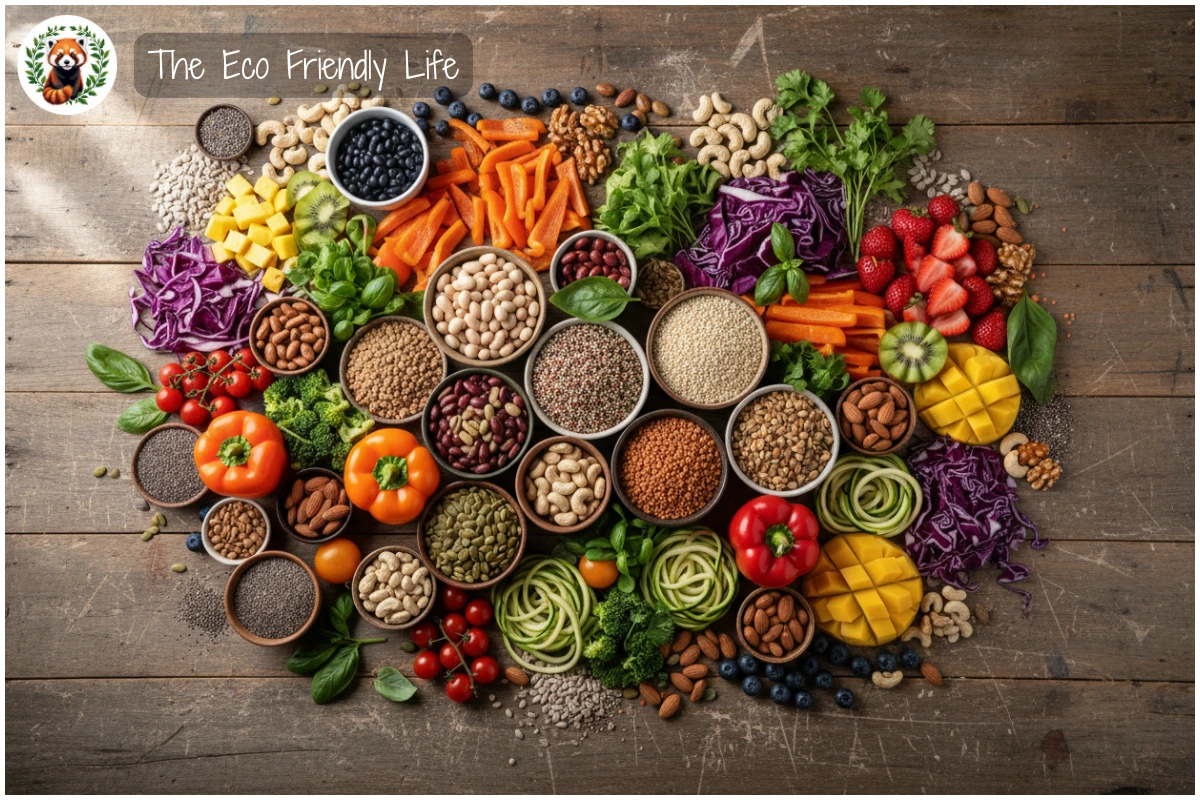Every meal you eat tells a story about our planet. The choices we make at the dinner table have an impact far beyond our homes, shaping the future of our climate, water resources, and biodiversity. Food production, particularly the raising of livestock, has emerged as one of the most significant environmental challenges of our time, accounting for roughly one-third of all global greenhouse gas emissions. Yet within these everyday choices lies an extraordinary opportunity: by shifting toward more plant-based eating patterns, we can dramatically reduce our individual environmental footprint while contributing to a global movement toward planetary health.
The science is clear and compelling. Recent research has revealed that transitioning to plant-based diets has the potential to reduce diet-related greenhouse gas emissions by up to 49%, land use by 76%, and water consumption by 21%, while simultaneously delivering substantial health benefits. This isn’t about perfection or all-or-nothing commitments; rather, it’s about understanding how the food on your plate affects the world around you and discovering practical ways to align your daily choices with your environmental values.
I’m Al, and I’m passionate about helping people understand this connection and take meaningful action in their lives. Whether you’re considering flexitarianism, vegetarianism, or full veganism, there’s a plant-forward path that can work for you and our planet. Keep reading to discover how your dietary choices can become one of the most powerful tools you have for environmental action.
Understanding the True Cost of Animal Agriculture
The staggering environmental footprint of livestock production: The livestock sector stands as one of the world’s largest drivers of environmental degradation, claiming responsibility for a disproportionate share of agriculture’s climate impact. While meat and dairy production account for only 18% of global dietary calories and 37% of total protein, they consume the majority of global farmland and generate the bulk of agricultural emissions. Beef production alone represents approximately 25% of all food-related emissions, with a single kilogram of beef generating approximately 70 kg of greenhouse gas equivalents, compared to just 2.5 kg for wheat or 3.2 kg for tofu.
Water depletion and pollution: The water demands of animal agriculture are staggering. Nearly half of all water used in the United States goes toward raising livestock, with producing a pound of beef requiring 1,800 gallons of water—approximately six times more water per gram of protein than legumes require. Beyond sheer volume, livestock farming creates severe water quality issues through nutrient runoff from manure and fertilizers. Recent research has found that replacing just 10 percent of conventional meat consumption with plant-based alternatives would reduce nitrate levels in groundwater by up to 20 percent, directly protecting drinking water supplies in agricultural communities.
Deforestation and biodiversity loss: Livestock production has emerged as a primary driver of deforestation, particularly in bio-diverse regions. Around 77% of agricultural land globally is dedicated to livestock production and animal feed crops, with over 75% of all soy grown destined for livestock feed rather than human consumption. In the Amazon rainforest alone, cattle ranching is responsible for approximately 80% of deforestation, destroying irreplaceable ecosystems and eliminating habitats for countless species. A groundbreaking 2025 study revealed that deforestation for livestock farming causes roughly 60% more damage to biodiversity than previously estimated, with effects extending far beyond local environmental impacts.

The interconnection between our food systems and environmental health runs deeper than most people realize. Each dietary choice creates a cascade of consequences that either degrades or restores the ecosystems we all depend upon. Understanding these impacts becomes the foundation for exploring practical solutions—which is where the science behind plant-based diets offers compelling evidence for positive change.
The Science Behind Plant-Based Climate Solutions
How plant-based diets reduce greenhouse gas emissions: The climate benefits of plant-based eating are substantial and scientifically documented. A comprehensive 2025 study published in Frontiers in Nutrition compared nutritionally balanced weekly menus across four dietary patterns and found that moving from an omnivorous diet to a vegan diet reduced carbon emissions by 46%, water use by 7%, and land use by 33%. The pathway to these reductions is straightforward: plant-based foods simply require fewer resources and produce less pollution at every stage of production compared to animal products. Because livestock themselves produce methane through digestion (a process called enteric fermentation), and their production requires extensive feed crops grown with fertilizers and pesticides, eliminating animal products dramatically shrinks the carbon footprint of what ends up on your plate.
Comprehensive environmental advantages beyond carbon: While greenhouse gas reduction often dominates the conversation, plant-based diets offer multifaceted environmental benefits. A landmark 2023 University of Oxford study analyzing real data from over 55,000 people across 119 countries found that vegans produce approximately 75% fewer emissions, use 54% less water, and require 66% less land compared to high meat-eaters (those consuming over 100 grams of meat daily). These reductions compound: according to research modeling how global adoption of plant-based diets would affect planetary boundaries, if just 50% of the world’s main animal products were replaced by plant-based alternatives, net forest and natural land loss would be almost entirely halted, and agricultural greenhouse gas emissions would decline by 31% by 2050 compared to 2020 levels.
Soil health and regeneration: Often overlooked in discussions of environmental impact, soil represents a critical frontier in climate action. Conventional livestock farming contributes to soil degradation through overgrazing, compaction, and erosion, while also reducing soil carbon storage capacity. In contrast, diverse plant-based agriculture, particularly when incorporating crop rotation and agroecological practices, actively improving soil health and carbon sequestration—the process by which carbon dioxide is captured and stored in soil organic matter. This creates a virtuous cycle where healthier soils produce more nutritious foods while simultaneously storing atmospheric carbon and increasing resilience to extreme weather events.

The scientific evidence consistently demonstrates that dietary shift isn’t merely one solution among many—it represents a foundational strategy that multiplies the effectiveness of other environmental actions we might take. Making the transition to plant-based eating easier often requires access to convenient, quality resources and products that genuinely support your journey.
Retailers That Support the Planet – Our Product Recommendations
Food choices become easier when we have access to convenient, high-quality plant-based options that genuinely support environmental goals. The retailers below have earned recognition for their commitment to plant-based eating and sustainability.
Our Retailer Recommendation for Adults
Nutriciously: Nourishing Plant-Based Living
Nutriciously brings together plant-based recipes, meal plans, and nutritional guidance created by certified vegan nutritionists and health experts. The platform makes transitioning to plant-based eating straightforward through comprehensive resources, seasonal meal plans complete with grocery lists and meal prep guidance, and recipes designed for real-world cooking. Their website empowers individuals with the knowledge and practical tools needed to embrace plant-based eating while maintaining nutritional completeness, directly supporting the shift toward more sustainable dietary patterns.
Our Retailer Recommendation for Kids/Families
HelloFresh: Convenient Meals for Busy Families
HelloFresh offers the convenience of meal kits with carefully selected ingredients and easy-to-follow recipes delivered to your door, featuring multiple plant-based options each week. For families seeking to reduce their environmental footprint without overhauling their entire approach to meals, HelloFresh provides vegan and vegetarian selections that make plant-based eating accessible alongside traditional family favorites, allowing households to experiment with plant-forward recipes at their own pace and gradually build confidence in preparing satisfying plant-based meals.
With these partnerships, your next grocery delivery or meal kit can become an active contribution to environmental sustainability. However, understanding the range of dietary approaches available—from gradually reducing meat consumption to full veganism—helps you choose the path that best aligns with your values, lifestyle, and environmental goals.
Practical Pathways: Flexitarianism, Vegetarianism, and Veganism
Flexibility and incremental change: One of the most important discoveries of modern sustainability research is that environmental progress doesn’t require perfection or overnight transformation. A flexitarian approach—reducing meat consumption without eliminating it entirely—delivers substantial benefits. People consuming less than 50 grams of meat per day have approximately half the environmental impact of high meat-eaters, while flexitarians eating meat just once per week can reduce food-related greenhouse gas emissions by over 50%. This insight liberates millions of people from an all-or-nothing mentality, making environmental progress feel achievable and sustainable.
The vegetarian spectrum: Moving along the plant-based spectrum produces measurable environmental improvements at each step. Pescatarians—who eat fish but not meat—reduce their dietary carbon footprint by approximately 15% compared to omnivores, while ovo-lacto-vegetarians who include eggs and dairy see reductions of up to 32%. These intermediate positions offer practical stepping stones for people transitioning their eating patterns, allowing cultural, social, and nutritional preferences to guide the pace of change while still delivering meaningful environmental benefits.
Full plant-based eating: A fully vegan diet represents the most environmentally optimized dietary pattern currently available. Research shows that vegans have the lowest carbon footprint across all dietary groups, with reductions reaching 46% or more compared to omnivorous diets, along with dramatic reductions in water use and land requirements. More importantly, comprehensive studies have confirmed that well-planned vegan diets are nutritionally adequate for people across all life stages, from childhood through older adulthood, provided attention is given to vitamin B12 supplementation and occasionally to vitamin D, iodine, and omega-3 fatty acids.

Whether you choose to reduce meat consumption gradually, embrace vegetarianism, or adopt veganism entirely, the environmental mathematics are encouraging: every plant-based meal represents a tangible investment in a more sustainable future. Translating these choices into action begins with practical, achievable steps that fit seamlessly into your daily routine.
Taking Action: Steps You Can Implement This Week
| Tip | How to Implement | Environmental Impact |
|---|---|---|
| Meatless Mondays | Commit to one fully plant-based day each week; build a simple rotation of favorite vegetarian meals. | Reduces weekly emissions by approximately 14% if adopted globally. |
| Breakfast transformation | Replace eggs or bacon with oatmeal, smoothie bowls, or toast with beans and vegetables. | A plant-based breakfast generates 90% fewer emissions than a typical animal-product breakfast. |
| Legume-based lunches | Build weekly lunches around lentils, chickpeas, or beans with seasonal vegetables and grains. | Legumes require minimal fertilizer and water while delivering complete proteins. |
| Flexitarian dinners | When cooking meat-based meals, reduce portion sizes by half and double the vegetables. | Each reduction in meat serving size compounds environmental benefits. |
| Plant-based snacking | Stock nuts, seeds, fruits, and vegetables instead of processed dairy or meat snacks. | Plant-based snacks consistently have lower environmental footprints than animal-derived options. |
| Local and seasonal plants | Shop at farmers markets for seasonal vegetables and purchase dried legumes in bulk. | Reduces transportation emissions and supports local food systems resilience. |
| Try one new recipe weekly | Explore plant-based versions of foods you love: burgers, pasta, curries, or tacos. | Experimentation builds confidence and prevents dietary monotony that derails dietary changes. |
| Plant-based substitutions in favorite recipes | Replace ground meat with lentils or crumbled tofu; swap dairy milk with plant alternatives. | Maintains familiar flavors and textures while reducing environmental impact. |
| Reduce food waste from produce | Plan meals around what’s in your kitchen; learn storage methods that extend freshness. | Food waste accounts for massive environmental costs; plant foods are easier to use creatively. |
| Build a plant-based pantry | Stock staples like rice, pasta, canned tomatoes, beans, and a variety of spices. | Home cooking with whole foods consistently beats processed convenience options environmentally. |
These practical steps demonstrate that reducing environmental impact through food choices doesn’t require elaborate preparation or sacrifice—it simply requires intentional decision-making and experimentation. As you begin implementing these changes, questions naturally arise—which is why addressing common concerns helps people move forward with confidence rather than hesitation.
Frequently Asked Questions
Is a plant-based diet actually healthier? Research consistently demonstrates that plant-based diets reduce the risk of heart disease, type 2 diabetes, certain cancers, and early mortality when planned to include adequate protein, vitamin B12, and other essential nutrients. Health benefits and environmental benefits align beautifully with plant-based eating.
What about nutritional deficiencies in plant-based diets? Well-planned plant-based diets meet all nutritional needs except B12, which requires supplementation or fortified foods; many people benefit from attention to vitamin D, iodine, iron, and omega-3 sources as well. These manageable considerations represent minor adjustments compared to the comprehensive environmental and health benefits gained.
Can my family eat plant-based meals together? Absolutely. Most cultures have traditional plant-based dishes, and plant-based cooking needn’t exclude others at the table—serving components separately or adding optional meat at the side allows everyone to participate comfortably.
Will eating plant-based be more expensive? Research from 2024 found that participants following a low-fat vegan diet spent 19% less on food than those eating typical Western diets, saving about $1.80 per day by reducing spending on animal products and added fats. Plant-based eating is often the most affordable option when built around whole foods.
Organizations to Support – Our Recommendations
Numerous global organizations are working to transform food systems toward sustainability and plant-based solutions, amplifying individual efforts through systemic change.
- Physicians Committee for Responsible Medicine drives policy change and education around plant-based nutrition, conducting influential research on the health and environmental benefits of plant-based diets while providing evidence-based guidance that shapes dietary recommendations worldwide. Their work directly bridges personal dietary choices with public health policy transformation, and you can support their mission through their donation page.
- World Wildlife Fund (WWF) works globally to transform food systems toward sustainability through their comprehensive initiatives addressing deforestation, sustainable agriculture, and dietary transformation. Their research and advocacy ensure that environmental impacts of food production remain central to climate policy discussions across all nations, and you can contribute to their conservation work directly.
- Oxfam operates at the intersection of food security, sustainable agriculture, and climate justice, particularly supporting small-holder farmers and rural communities in transitioning toward resilient, sustainable food systems. Their work recognizes that environmental sustainability and social equity are inseparable goals in food transformation, and your support helps fund these critical initiatives.
Supporting these organizations amplifies the collective power of individual dietary choices into systemic transformation.
Resources and Further Reading
Deepen your understanding of food systems sustainability and plant-based eating through these authoritative global resources.
- EAT-Lancet Commission presents the latest expert consensus on healthy, sustainable, and just food systems, providing comprehensive evidence-based guidance on the Planetary Health Diet and concrete actions for transforming global food production and consumption patterns to support both human and planetary health.
- FAO Sustainable Food Systems offers extensive research, policy guidance, and practical resources from the United Nations Food and Agriculture Organization on sustainable food systems, climate-smart agriculture, and the environmental impacts of different production methods and dietary patterns.
- WWF Food Practice equips individuals, communities, and policymakers with practical resources, case studies, and implementation guidance for building food systems that restore rather than degrade ecosystems while supporting farmer livelihoods and food security.
These resources provide pathways for anyone seeking deeper understanding of how food systems shape our environmental future.
Our Related Articles

Exploring Sustainable Gardening And Its Benefits
Sustainable gardening represents one of the most accessible pathways toward environmental stewardship that individuals can embrace in their daily lives. Whether you cultivate a small…
Read More
The Key Principles And Benefits Of Sustainable Food
Our planet faces a critical moment. While nearly 783 million people experience hunger globally, we waste approximately one-third of all food produced. The way we…
Read MoreConclusion
The environmental case for plant-based eating is overwhelming and multifaceted: dramatically reduced greenhouse gas emissions, vastly decreased water consumption, prevention of deforestation and biodiversity loss, and improved soil health all converge around dietary transformation toward more plant-forward patterns. Yet beyond the data and statistics lies a simpler truth: every meal represents an opportunity to vote for the kind of world you want to inhabit. Whether you take small steps through flexitarianism, commit to vegetarianism, or embrace veganism, you’re participating in a quiet but profound revolution that moves us toward a food system that nourishes both people and planet.
Your individual choices matter enormously—not because any single person will solve environmental challenges alone, but because millions of people making similar choices create markets, change cultural norms, and demonstrate that better ways of eating are possible, delicious, and achievable. The path forward isn’t about perfection but about progress, beginning with the very next meal you prepare.
How has learning about the environmental impact of plant-based diets changed your perspective on food? Whether you’re already eating plant-based or just beginning to explore these options, I’d love to hear your thoughts, experiences, and questions in the comments section below—let’s continue this conversation about food, environment, and our collective future together.


